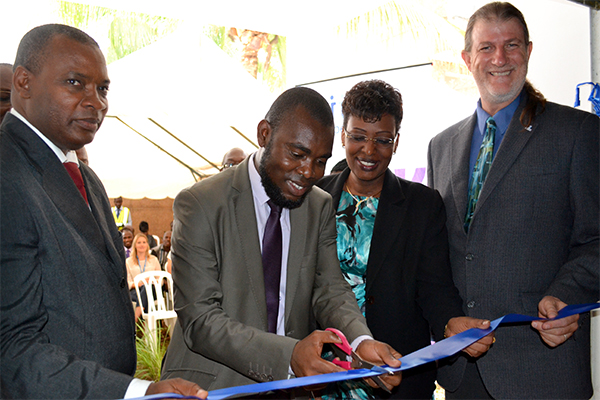Interpeace opens a regional office for West Africa

Last Friday, Interpeace's Regional Office for West Africa was officially inaugurated in Abidjan, Côte d'Ivoire. This newly opened regional presence allows Interpeace to reinforce and strengthen its strategic engagement in the region and provide assistance to conflict-affected societies.
In the presence of M. Coulibaly Famoussa, Chief of Cabinet of the Ministry of State, Ministry of Planning and Development, Touré Vamara, City Councillor of Cocody, representatives of other national authorities, members of the international community, several Interpeace colleagues from across the world and members of Interpeace's local partner team in Côte d'Ivoire, the office was officially opened with a ribbon cutting ceremony.
Reinforcing long-standing support to the region
Following the introduction, Anne Moltes and Sina Zintzmeyer, Interpeace's Regional Coordinators for West Africa, introduced the work of the different partner teams in the region and elaborated on Interpeace's peacebuilding methodology.
"We've been supporting peacebuilding initiatives in West Africa since 2006 and this opening is the result of intense work and today marks an important step in Interpeace's history," marked Sina in her presentation.
The Regional Office for West Africa supports Interpeace's peacebuilding initiatives in Côte d'Ivoire, Guinea-Bissau, Liberia and Mali where it works closely with local partner teams and supports them in their quest for sustainable peace.
A regional presence in Côte d'Ivoire
"We welcome Interpeace's Regional Office for West Africa with open arms in Côte d'Ivoire and we appreciate Interpeace's support in reconciling Ivorians between each other and in assisting them in finding solutions to peacebuilding," states M. Coulibaly Famoussa, Chief of Cabinet of the Ministry of State, Ministry of Planning and Development.
He adds: "The Minister of State, Minister of Planning and Development and the government and its development partners thank Interpeace for the quality of their recent research that is based on a truly original methodology: participatory action research."
Jerry McCann, Interpeace's Deputy Director-General, Operations, adds: "We met wonderful people in Côte d'Ivoire that supported us in setting up the office." Interpeace's efforts to set up a regional presence in Côte d'Ivoire have been received positively by the Ivorian authorities also based on Interpeace's peacebuilding work in the country.
"In March 2013 we were able to publish the results of a participatory research process on the dynamics and root causes of conflict in the western regions of Côte d'Ivoire. We can now build on this research to move the initiative forwards," adds Dr. Sévérin Koumé, Director of INDIGO.
Interpeace's work in the region
The overall goal of Interpeace and its local partner Voz di Paz is to remove the obstacles to the consolidation of peace in Guinea-Bissau by encouraging dialogue and engaging a broad range of actors from all walks of life throughout the country in the peace process.
Interpeace has been working in Liberia in collaboration with its local partner P4DP (Platform for Dialogue and Peace) since 2006. The work in Liberia currently focuses on enabling youth and women in the border area with Côte d'Ivoire to become peacebuilding leaders and legitimate actors of change. P4DP also supports the Roadmap process for national healing and reconciliation led by governmental partners; and links its efforts in the Liberian border area with the programmatic approach taken by Interpeace in the western part of Côte d'Ivoire.
In Mali, Interpeace, jointly with its local partner IMRAP (Institut Malien de Recherche Action pour la Paix), seeks to contribute to the establishment of a culture of inclusive, participatory and constructive dialogue. This will help restore and enhance trust between the different sectors and levels of society, and to enable Malian society to deal with the present and future challenges and opportunities for peace and social cohesion in Mali.
A decentralized structure allows for more efficiency
"The opening of this regional office further demonstrates Interpeace's commitment to the West Africa region, bringing us closer to our local partners and their efforts to strengthen peace within their communities," explains Jerry McCann, Interpeace's Deputy Director-General, Operations at the event.
The opening of the West Arica presence is part of Interpeace's decentralization strategy that was launched three years ago as part of its 2011-2015 Strategic Plan. The decentralized structure allows Interpeace to support peacebuilding initiatives in a more efficient and cost-effective manner.
